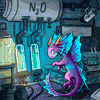Chaplin's final speech from "The Great Dictator"
3 years ago
The Great Dictator was Chaplin’s first film with dialogue.
Chaplin plays both a little Jewish barber, living in the ghetto, and Hynkel, the dictator ruler of Tomainia.
Chaplin spent many months drafting and re-writing the speech for the end of the film.
A call for peace from the barber who has been mistaken for Hynkel.
Many people criticized the speech, and thought it was superfluous to the film.
Others found it uplifting.
Regrettably Chaplin’s words are as relevant today as they were in 1940.
To be honest the only part i do not like about this speech is the call against "machines".
The only thing "machines" are guilty of is having uncaring "parents".
That use them and enforce them and dispose of them without ever wanting to understand them.
But given what machines meant to Chaplin (the symbol of oppression) i can totally understand his point of view.
Chaplin plays both a little Jewish barber, living in the ghetto, and Hynkel, the dictator ruler of Tomainia.
Chaplin spent many months drafting and re-writing the speech for the end of the film.
A call for peace from the barber who has been mistaken for Hynkel.
Many people criticized the speech, and thought it was superfluous to the film.
Others found it uplifting.
Regrettably Chaplin’s words are as relevant today as they were in 1940.
To be honest the only part i do not like about this speech is the call against "machines".
The only thing "machines" are guilty of is having uncaring "parents".
That use them and enforce them and dispose of them without ever wanting to understand them.
But given what machines meant to Chaplin (the symbol of oppression) i can totally understand his point of view.

kangaroo_jack
~kangaroojack
I have a version with a music background I like to listen to when I truly get down. I feel for the Russian people, and the current generation, and to all people in that Millennial generation and below, suffering under the impotence of weak old men afraid of their mortality.


❤️

 FA+
FA+